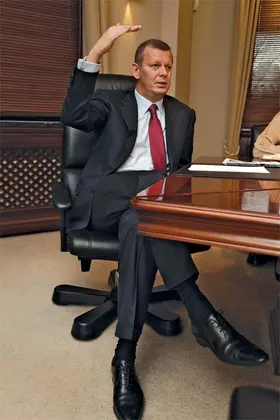“I think that we – the opposition and authorities – should scale back political and personal ambitions and find common ground to shift the situation toward a peaceful course,” said the Donetsk native hurriedly as if on cue at the outset of the interview.
However, the multimillionaire Party of Regions lawmaker wasn’t so gracious when the Kyiv Post started to inquire about his business activities. He denied that Slav AG is an offshore scheme and that it is used for illicit purposes. “It had very few audits from the taxing authorities,” Serhiy Klyuyev said, proudly explaining how transparently the company operates.
JOIN US ON TELEGRAM
Follow our coverage of the war on the @Kyivpost_official.
The Klyuyev brothers’ Austrian firm was registered in 1994. It reportedly owns more than 70 companies in Ukraine. Its most significant asset reportedly is Activ Solar – a solar power station developer in Ukraine that is managed and owned by Serhiy Klyuyev’s son-in-law Kaveh Ertefai.
Serhiy Klyuyev denies having any connection to Activ Solar, and the company has denied the Klyuyevs are its end-owners.
Forbes Ukraine estimates the brothers’ fortune at $216 million, though Serhiy Klyuyev says the figure is “exaggerated.”
Whatever their net worth, it could be seriously endangered after Austrian Foreign Minister Sebastian Kurz called on the European Union to the freeze assets of Ukrainian officials deemed responsible for the deaths and violence on Kyiv’s streets.
Andriy Klyuyev is viewed as a hawk within Yanukovych’s inner circle, but his brother denies he had a role in the bloody violence that engulfed Kyiv’s central streets.
France’s top diplomat Laurent Fabius also supported sanctions. The U.S. and Canada have gone further by already introducing visa sanctions against several Ukrainian officials responsible for provoking violent clashes in Ukraine.
“I think I haven’t done anything illegal to have visa sanctions imposed on me,” Serhiy Klyuyev said. “If the EU decides to introduce sanctions, it’s its right, but I think that sanctions should be introduced when someone is violating (rules of) public life.”
Klyuyev strongly condemned the forceful crackdowns which have resulted in dozens of deaths and clearly separates himself from his combative colleague Oleh Tsariov.
When asked if there are divisions inside the Party of Regions, Serhiy Klyuyev said no, at least that is until Tsariov’s name is mentioned. “There are discussions,” he adds when Tsariov is brought up.
“The fact that all that (violence) happened is a big tragedy for our country,” he continued. “The president has done a lot for the last three weeks for peaceful dialogue – (Mykola) Azarov resigned, we revoked the (draconian) laws (passed on Jan.16), we passed and implemented an amnesty law.”
It implied the release of arrested protesters on the condition they vacate occupied government buildings. It came into effect on Feb.17, a day after protesters left Kyiv City Hall. Some of them were released from detention but placed under house arrest and still face court trials.
However, clashes between police officers and protesters resumed on Feb.18 after parliamentary speaker Volodymyr Rybak refused to register a bill to change the constitution and transform Ukraine into a parliamentary republic.
This week there were at least 67 deaths, including 13 police officers, with more than 1,000 injured. Numerous media footage showed snipers and police officers armed with automatic rifles shooting at protesters from building rooftops.
On Feb. 20, Acting Interior Minister Vitali Zakharchenko announced that he signed several orders allowing police officers to use live ammunition should protesters fire at the police or capture them.
“Using firearms is unacceptable either against protesters or police officers. I’m not justifying (the use of) arms; the authorities have to ensure public order in a legal way,” Serhiy Klyuyev said.
Meanwhile, as the political crisis deepens and the death toll mounts, at least 17 lawmakers left the Party of Regions parliamentary faction in protest. Notably, Kyiv city managrer Volodymyr Makeyenko quit the party. After announcing the move on Feb. 20, Makeyenko pledged allegiance to the people of Ukraine and ordered Kyiv’s subway system to re-open.
Serhiy Klyuyev says he does not plan to quit the Party of Regions, and is hopeful the crisis will be resolved.
“I’m not going to leave the Party of Regions, it’s the very first party of which I became a member and it’s the biggest party,” he stated.
However, he admits that “we’re on the brink of a big cataclysm,” adding that a financial default may ensue if the political crisis persists.
Kyiv Post staff writer Anastasia Forina can be reached at [email protected]. Kyiv Post associate business editor Ivan Verstyuk contributed to this story.
You can also highlight the text and press Ctrl + Enter




